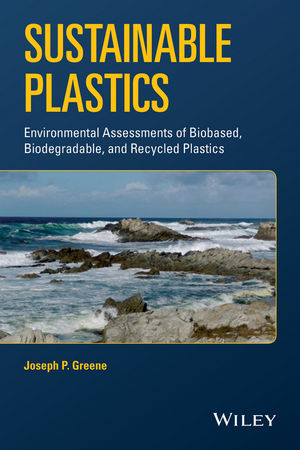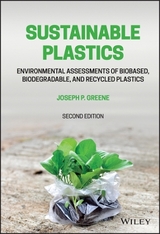
Sustainable Plastics – Environmental Assessments of Biobased, Biodegradable, and Recycled Plastics
John Wiley & Sons Inc (Verlag)
978-1-118-10481-1 (ISBN)
- Titel erscheint in neuer Auflage
- Artikel merken
Providing guidelines for implementing sustainable practices for traditional petroleum based plastics, biobased plastics, and recycled plastics, Sustainable Plastics and the Environment explains what sustainable plastics are, why sustainable plastics are needed, which sustainable plastics to use, and how manufacturing companies can integrate them into their manufacturing operations. A vital resource for practitioners, scientists, researchers, and students, the text includes impacts of plastics including Life Cycle Assessments (LCA) and sustainability strategies related to biobased plastics and petroleum based plastics as well as end-of-life options for petroleum and biobased plastics.
Dr. Joseph Greene is a professor in the Mechanical Engineering and Sustainable Manufacturing Department at California State University. Dr. Greene began teaching in August of 1998 after a 14-year career with General Motors Corporation in Detroit, Michigan. His research interests include compostable and biodegradable polymers, biobased plastics, recycled plastics, composting technology, and anaerobic digestion.
Preface i
Acknowledgements ii
Glossary iii
Chapter 1. Introduction to Sustainability 1
1.1 Sustainability Definition
1.2 Green Chemistry Definitions
1.3 Green Engineering Definitions
1.4 Sustainability Definitions for Manufacturing
1.5 Life Cycle Assessment (LCA)
1.6 Lean and Green Manufacturing
1.7 Summary
1.8 References
1.9 Review Questions
1.10 Review Problems
1.11 Review Exercises
Chapter 2. Environmental Issues 13
2.1 The Planet is Warming
2.2 Melting of Glaciers
2.3 Rising Seas
2.4 Causes of Global Warming
2.5 Ocean Pollution and Marine Debris
2.6 Chemical Pollution from Plastics
2.7 Landfill Trash
2.8 Summary
2.9 References
2.10 Review Questions
2.11 Review Problems
2.12 Review Exercises
Chapter 3. Life Cycle Information 46
3.1 LCA for Environmental Hazards
3.2 Life Cycle Assessment (LCA) Definitions
3.3 ISO 14040/14044 LCA Standards
3.4 Sensitivity Analysis
3.5 Minimal Acceptable Framework for Life Cycle Assessments (LCAs)
3.6 LCI for Petroleum-Based Plastics
3.7 LCA for Biobased Poly Lactic Acid (PLA)
3.8 Summary
3.9 References
3.10 Review Questions
3.11 Review Problems
3.12 Review Exercises
Chapter 4. Biobased and Biodegradable Polymers 63
4.1 Biobased and Biodegradable Definitions
4.2 Biobased Polymers
4.3 Petroleum-based Compostable Polymers
4.4 LCA of Compostable and Biodegradable Polymers
4.5 Summary
4.6 Review Questions
4.7 Review Problems
4.8 Review Exercises
Chapter 5. Biobased and Recycled Petroleum-Based Plastics 95
5.1 Biobased Conventional Plastics
5.2 Recycled Petroleum-Based Plastics
5.3 Oxodegradable Additives for Plastics
5.4 Summary
5.5 References
5.6 Review Questions
5.7 Review Problems
5.8 Review Exercises
Chapter 6. End-of-Life Options for Plastics 113
6.1 U.S. EPA WARM Program
6.2 Mechanical recycling of plastics
6.3 Chemical recycling
6.4 Composting
6.5 Waste to energy
6.6 Landfill Operations
6.7 LCA of end-of-life options
6.8 Summary
6.9 References
6.10 Review Questions
6.11 Review Problems
6.12 Review Exercises
Chapter 7. Sustainable Plastic Products 129
7.1 Introduction
7.2 Sustainable plastic packaging
7.3 Sustainable plastic grocery bags
7.4 LCA of sustainable plastic bottles
7.5 Summary
7.6 References
7.7 Review Questions
7.8 Review Problems
7.9 Review Exercises
Chapter 8. Biobased and Biodegradation Standards for Polymeric Materials 169
8.1 Introduction
8.2 Biobased standard test method
8.3 Industrial Compost Environment
8.4 Marine Environment
8.5 Anaerobic Digestion
8.6 Active Landfill
8.7 Home Compost
8.8 Soil biodegradation
8.9 Summary
8.10 References
8.11 Review Questions
8.12 Review Problems
8.13 Review Exercises
Chapter 9. Sustainable Strategies for Plastics Companies 213
9.1 Sustainable plastics manufacturing and best practices
9.2 Manual creation of LCA calculations
9.3 Carbon Credits and Carbon Taxes
9.4 Summary
9.5 References
9.6 Review Questions
9.7 Review Problems
9.8 Review Exercises
Chapter 10. Future Sustainable Plastics 223
10.1 Sustainable biobased plastics from renewable non-food sources
10.2 Sustainable traditional plastics from renewable non-food sources
10.3 Growth in biobased plastics with development of durable goods
10.4 Growth in biobased plastics for pharmaceuticals and medical devices
10.5 Summary
10.6 References
10.7 Review Questions
10.8 Review Problems
10.9 Review Exercises
Appendix A. Injection Molding 234
A.1 Introduction
A.2 Process control during injection molding
A.3 Molds for injection molding
A.4 Molding defects
A.5 References
Appendix B. Extrusion 249
B.1 Introduction
B.2 Extrusion processing
B.3 Extrusion process control
B.4 Extrusion defects
B.5 References
Appendix C. Blow Molding 257
C.1 Extrusion blow molding
C.2 Injection stretch blow molding
C.3 References
Appendix D. Industrial Compost Biodegradation Testing 261
D.1 Methodology
D.2 Materials
D.3 Carbon Content Testing Results
D.4 Biodegradation Results
D.5 Phytotoxicity Testing
D.6 Regulated Heavy Metals Testing
D.7 References
Appendix E. Marine Biodegradation Testing 269
E.1 Methodology
E.2 Materials
E.3 Experimental Set-up
E.4 Marine Biodegradation Results
Appendix F. Answers to Selected Questions at the End of Each Chapter 274
Appendix G.
Index 278
| Erscheint lt. Verlag | 23.12.2014 |
|---|---|
| Verlagsort | New York |
| Sprache | englisch |
| Maße | 156 x 234 mm |
| Gewicht | 578 g |
| Themenwelt | Naturwissenschaften ► Biologie ► Ökologie / Naturschutz |
| Naturwissenschaften ► Chemie ► Organische Chemie | |
| Technik ► Maschinenbau | |
| Technik ► Umwelttechnik / Biotechnologie | |
| ISBN-10 | 1-118-10481-1 / 1118104811 |
| ISBN-13 | 978-1-118-10481-1 / 9781118104811 |
| Zustand | Neuware |
| Haben Sie eine Frage zum Produkt? |
aus dem Bereich



